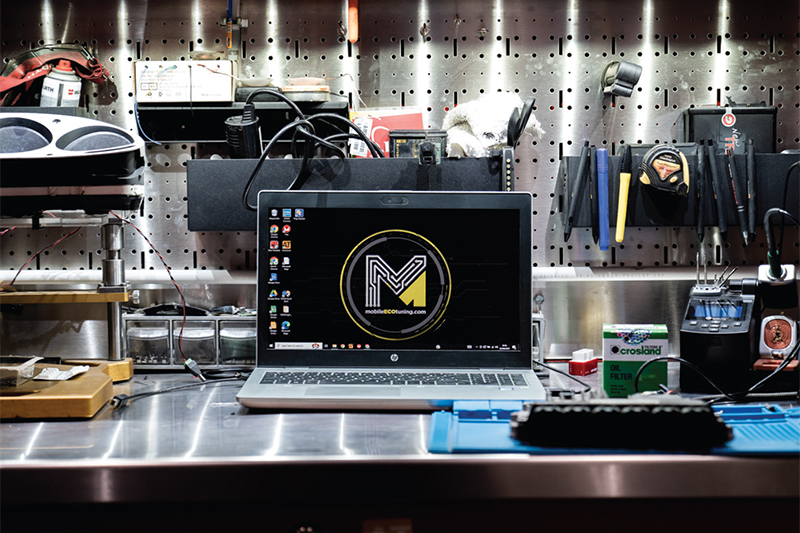
Mobile Eco Tuning discusses how it is supporting the independent aftermarket.
As we’re all aware, the motor trade is changing at a pace faster than most of the cars we work on. Modern vehicles are getting more complex by the day and workshops are facing real challenges keeping up with technologies like DOIP, online programming and even basic regeneration functions. The net result is a raft of tough decisions about the kind of diagnostic tech workshops need to invest in.
It’s not just about keeping up with the latest vehicles either. While dealer-level diagnostic capabilities are essential for newer models, workshops need solutions for every type of repair scenario. Sometimes it’s about programming a used ECU rather than fitting an expensive new unit, or finding creative solutions for body module issues that won’t break the customer’s budget.
This is where experience really counts. Mobile Eco Tuning’s decade of hands-on experience in using and supplying diagnostic equipment gives them unique insight into what actually works in real-world situations. They’re not just selling tools – they’re using them daily in their own diagnostic operations.
For independent workshops, this practical experience is invaluable. When you’re considering investing in diagnostic equipment, you need to know it can handle everything from basic fault-finding to complex module programming. More importantly, you need to know which tools offer the best value for specific tasks.
For example, take module cloning. Not every customer drives a new premium vehicle, and sometimes finding cost-effective repair solutions is crucial. Having the right diagnostic capabilities means you can offer options that keep repairs affordable while maintaining profitability.
Versatility
Modern workshops need to be versatile. One day you might be dealing with a straightforward DPF regeneration, the next you’re tackling complex ADAS calibration or hybrid system diagnostics. Having access to advice from technicians who actually use these tools daily can help workshops make informed decisions about their diagnostic capabilities.
It’s about having the right tools for every situation. Whether it’s programming new keys, coding replacement modules or performing manufacturer-specific functions, workshops need reliable solutions that deliver results. The key is knowing which tools are best suited for specific tasks – knowledge that only comes from practical experience.
For independent garages, staying competitive means being able to handle whatever comes through the door. This might mean having several different diagnostic solutions available, each suited to particular tasks or vehicle types. Understanding which tools complement each other and provide the best coverage for your customer base is crucial.
The rapid march of vehicle tech means workshops need to be prepared for everything from traditional diagnostics to the latest online programming requirements. Having a supplier who actually uses these tools in their own workshop means you’re getting advice based on real-world experience, not just sales talk.
Future-proofing your workshop isn’t just about buying the latest equipment – it’s about making sound choices that give you the capabilities you need at a price that makes business sense. Whether you’re dealing with high-end vehicles that need dealer-level diagnostics or older vehicles requiring more creative solutions, having the right diagnostic capabilities is essential.
This practical, experience-based approach to diagnostic equipment helps workshops avoid costly mistakes and builds confidence in their diagnostic capabilities. It’s about having solutions that work in the real world, backed by knowledge of what these tools can actually deliver in day-to-day workshop operations.
For workshops looking to expand their diagnostic capabilities, having access to this kind of practical experience can make all the difference. It helps ensure investments in diagnostic equipment translate into improved service offerings and better business outcomes, whatever type of work you’re handling.
Current and emerging technologies
The future of automotive repair lies in having the right combination of diagnostic capabilities to handle both current and emerging technologies. Success comes from making informed choices about equipment investments, based on real-world experience and practical workshop requirements.
When it comes to diagnostic investments, workshops need to think strategically. It’s not always about having the most expensive kit – it’s about having the right tools for your specific customer base and business model. Sometimes that means investing in dealer-level equipment, other times it’s about having reliable tools that can handle bread-andbutter diagnostic work efficiently.
The ability to offer cost-effective solutions is becoming increasingly important. While main dealer solutions might be the obvious choice for newer vehicles, having alternative diagnostic options can help workshops provide more affordable repairs when appropriate. This flexibility in diagnostic capabilities can be a real competitive advantage.
Understanding the practical applications of different diagnostic tools is crucial. For example, knowing which programming tools work best for specific manufacturers, or which diagnostic platforms offer the best coverage for particular vehicle types. This kind of knowledge only comes from actual workshop experience.









